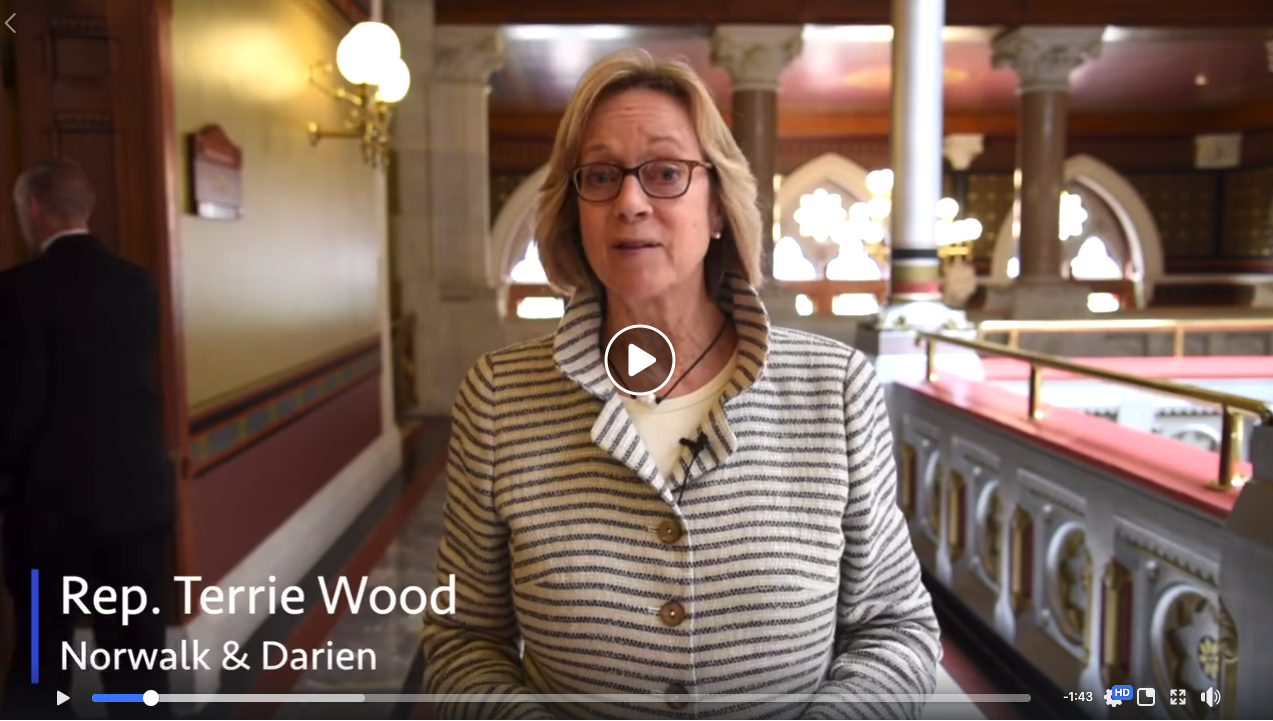Hartford Current: State Rep. Terrie Wood updates residents after the end of this legislative session

With the legislative session recently concluded (June 5), I thought this would be a great time to update you on the budget and important bills that passed in the General Assembly, and how they might affect you.
The good news
The good news is that a balanced budget passed before the end of session this year. On a positive note, funding for education in Norwalk and Darien will remain essentially the same as it was in the ’18 &’19 biennium budget.
Our Excess Cost Grant (funding that covers Special Education needs) will also be reimbursed at previous levels.
School regionalization efforts are not moving forward, nor are regional property taxations.
Responsibility for teacher pensions will also not be pushed onto local municipalities and local health departments are not being mandated to regionalize.
In addition, the Medicare Savings Program (healthcare for senior citizens) is fully funded and the social security exemption, as well as the tax on pensions, continues their phase-in to incomes $75,000 and under.
There are no income tax increases and the percent of our sales tax does not increase.
Finally, we have a balance of $2 billion in our Budget Reserve Fund.
The not-so-good news
Unfortunately, I must follow the good news with the not-so-good news. The budget increases spending by 2.4% in FY ’20 and 2.5% in FY ’21. It counts on revenue increases to close our $3.7 billion deficit – a total net increase of $1.75 billion over the biennium.
A “mansion tax” will go into effect on July 1, 2020 for any home with a selling price of $2.5 million or more. This 1% conveyance tax will be required in addition to the current 1.25% conveyance tax on homes over $800,000. Luckily, if the seller remains in Connecticut for three years after the sale, the tax will be refunded through a tax credit carried over three years. However, many residents who are selling their homes are doing so to move out of Connecticut and escape taxes like these.
There will be a new tax on motor vehicle trade-ins, a new 1% tax on prepared meals (in addition to the current 6.35% sales tax), the corporate surcharge of 10% will be made permanent, and there will be an increase in the Pass-Through Entity Tax of $50 million each year. Most of Connecticut’s small/medium businesses operate as Pass-Through Entities, so this would hurt those businesses and have a very negative impact on our economy.
$172 million previously allocated to the Special Transportation Fund will be swept to the General Fund.
The Teacher Pension Retirement System obligations have been reduced in the near term – this is only “in exchange” $17 billion extra interest to re-amortize over the 17 year extension that will be paid in future years as we spread out the cost of our responsibility to our teachers.
Progressive Democrats also pushed hard to raise the minimum wage in our state to $15/hour by 2023, with an automatic escalator clause in the following years, and approve Paid Family and Medical Leave (PFML). Six other states – including our neighbors of New York, Massachusetts and Rhode Island – have PFML programs, but ours has the richest benefits. It mandates that every private sector worker must contribute 0.5% of each and every paycheck to fund a program they may or may not intend to use. At any point, if the fund is determined to be unsustainable, the commissioner of the Department of Labor may unilaterally raise the contribution rate to ensure solvency. Startup costs for PFML are $13 million, and it will cost even more for a quasi-public organization staffed by newly-hired state employee union members to administer it.
While developing PFML and a new minimum wage are laudable goals for workers in our state, I believe we should have approached this in a way that is fair and sustainable to people, families, and small/large businesses alike. Common sense and basic math must prevail in the work we do to balance the important needs of our employees, employers and taxpayers.
In summary, though there are good things in this budget, it still spends more than we can afford and doesn’t do enough to restructure and rebalance our state’s fragile financial footing. We need to address our unchecked spending habits by finding realistic efficiencies for currently unsustainable things like state employee union pensions and retiree healthcare costs. We have an obligation to our constituents to make these changes and put our state on a path to much-needed fiscal stability. We will have another opportunity to do this next year.
This article originally appeared in The Darien Times on June 11, 2019.


